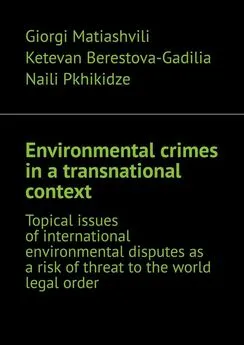Giorgi Matiashvili - Environmental crimes in a transnational context. Topical issues of international environmental disputes as a risk of threat to the world legal order
- Название:Environmental crimes in a transnational context. Topical issues of international environmental disputes as a risk of threat to the world legal order
- Автор:
- Жанр:
- Издательство:неизвестно
- Год:неизвестен
- ISBN:9785005620408
- Рейтинг:
- Избранное:Добавить в избранное
-
Отзывы:
-
Ваша оценка:
Giorgi Matiashvili - Environmental crimes in a transnational context. Topical issues of international environmental disputes as a risk of threat to the world legal order краткое содержание
Environmental crimes in a transnational context. Topical issues of international environmental disputes as a risk of threat to the world legal order - читать онлайн бесплатно ознакомительный отрывок
Интервал:
Закладка:
We hope, that this thesis will help to improve understanding of the relationship between the protection of human rights in accordance with the “European Convention on Human Rights” and the ambient environment.
*Keywords
Ecology, offense, human rights, resources, court, international, environment, environmental crimes, international law, human, hostile use, planet, environmental security, ecological environment (ecosystem), declaration, ecocide, international treaties, eco-terrorism, United Nations (UN), obligations, legal order, peace, law, justice, cooperation, state, damage, international legal responsibility.
*Preface/annotation
Human Being is part of nature. Outside of nature, without using its resources, he/she cannot exist. Nature will always be the basis and source of human life. In relation to a person, it performs a number of functions related to the satisfaction of his/her needs: ecological, economic, aesthetic, recreational, scientific, cultural and so on.
Ensuring a favorable quality of ambient environment and the organization of rational management of natural resources represents one of the most urgent problems of the entire world community. The awareness of the onset of the global environmental crisis by the authorities of most states of the world in the middle of the 20th century led to the formation of international cooperation in the field of ambient environment protection and a dynamic change in intrastate environmental legislation in most countries of the world. Despite the absence of a general framework agreement, the ambient environment is protected by international law. Various international treaties regulate specific environmental issues, such as for example climate change or biodiversity.
These treaties and ordinary international law assign various legal obligations to protect the ambient environment. This function is assigned to states, such as the obligation to inform, cooperate or limit wash-outs.
The proclamation of the human right onto a favorable ambient environment in the declaration of principles, adopted at the UN Stockholm Conference on the ambient environment in 1972, led to implementation (The English word-implementation is officially translated by the UN as “Effectuation”). The term was first used by the Human Rights Committee in 1981.
The original meaning of the word “implement” is to actualize something in life. it is the practical implementation within the state of international legal norms in order to fulfill the obligations assumed. With regard to the law, implementation is the actualization at the intrastate level of obligations envisaged in international agreements\international environmental norms and standards in the legislation of the countries of the world.
This was the impetus for the formation of environmental legal awareness among the population, the growth of the public environmental movement and the formation of judicial practice in cases of protecting the rights and legitimate interests of citizens in the field of environmental protection. All measures aimed at overcoming the crisis in the environmental field require the need for cooperation between states in the form of C-Global – a global dialogue format, and only through the joint efforts of all states, it is possible to fight against the environmental crisis. The most important issue of the new paradigm of sustainable development should be the reassessment of the environmental factor. Preservation and reproduction of the ambient environment should become an obligatory condition for the sustainable development of civilization. The representatives of the sciences society of international law not infrequently drew attention to the need to strengthen the international legal basis for environmental cooperation and create truly effective international control mechanisms in this field.
In our opinion, the development of international environmental cooperation should follow the principle of creating a single international legal environmental act, of one international environmental organization, and of one international environmental court.
&1 International law as the basis of the international legal order
The representations on peaceful existence has been evolved from the ideas about the artificiality of peace and the naturalness of hostility and war to humanity and the individual to the axiomatic concepts extoling universal peace on the planet as the only means to avoid nuclear and environmental catastrophe. Globalization can contribute to the awareness of the fragility of the entire human civilization and the uniqueness of its constituent socio-cultural formations. In our opinion, in order to achieve peace on the planet, it is necessary to abandon attempts to unify it by force. All the richness of the nature of planet Earth and human culture cannot be simplified and unified within the framework of one geopolitical, economic and cultural paradigm. It is this kind of aggressive attempts that can lead to the complete destruction of humankind and ecological environment of his habitat. In recent decades, the problem of preserving the whole world and ecosystem (ecological system) on our planet are becoming more and more relevant, overwhelmed by various political, social and geopolitical contradictions and side effects of scientific and technological progress.
One can rightfully speak of the 21st century as an era of exacerbation of civilizational conflicts and confrontation of civilizations at a new qualitative level.
International law, its principles and basic norms help to resolve the problem, which determine its nature and create support for its other norms and institutions, contributing to the stability of international relations. They represent the foundation of the international law and order. Violation of the basic principles of international law affects the rights and interests of most other members of the international community. International law is a system of legal principles and norms governing relations between states. International organizations can also act as subjects of international law. Sources of international law are international treaties and custom recognized by states. As there is no supranational authority over sovereign states, the international law is the law between states, not over them.
Which law is more important: International or National, the answer to this question depends on the legal traditions of a particular country. Most legal theorists believe that globalization processes will only become aggravated in the future. Problems that require joint efforts, such as transnational crime, ecological and technogenic safety; prevention of armed conflicts; protection of human rights will come to the fore. This will lead to the prevalence of international norms of law over national ones. Already, many countries have fixed in the basic laws the provision for such a priority. International law in most of its norms, which are recognized by all states of the world, is universal. In the part recognized not by all, but by most countries of the world, it is called general. The norms of international law established by the countries of one region create regional international law. The norms established by states in any field, for example, in energy, or in the field of production and marketing of oil, in navigation or air traffic, are called sectoral.
The norms establishing the rights and obligations between the two states are contained in numerous bilateral treaties.
At present, the central part of international law is the UN Charter, which contains the basic principles of modern international relations, obligatory for execution by all countries and possessing supremacy in relation to all other norms of international law.
Under the charter of the United Nations Organization, states pledged to develop friendly relations among nations based on respect for the principle of equal rights and self-determination of peoples, to fulfill in good faith the obligations assumed under the charter, to observe the principle of sovereign equality of all UN members, to resolve their international disputes by peaceful means in such a way as not to jeopardize the international peace, security and justice, to refrain in their international relations from the threat of force or using the force against the territorial integrity or political independence of any state, or in any other way, commit acts inconsistent with the purposes of the United Nations (UN). In addition, the UN Charter approved the principle of non-intervention in matters, essentially included within the domestic jurisdiction of any state (this principle, however, does not affect the application of compulsory measures on the basis of the Charter).
The basic principles of the UN Charter were confirmed and expanded in the declaration on principles of International Law, concerning friendly relations and cooperation among states in accordance with the UN Charter (October 24, 1970), and later in the Final Act of the Conference on Security and Cooperation in Europe, adopted in 1975 in Helsinki.
The declaration on principles of International Law concerning friendly relations and cooperation among states in accordance with the Charter of the United Nations (October 24, 1970) provided that: States shall refrain in their international relations from the threat with force or use of force against the territorial integrity or political independence of any state, or in any other manner inconsistent with the purposes of the United Nations.
States shall resolve their international disputes by peaceful means in such a way as not to endanger international peace, security and justice. States are bound by the Charter not to interfere in matters within the domestic jurisdiction of any state. States are obliged to cooperate with each other in accordance with the UN Charter.
By virtue of the principle of equal rights and self-determination of peoples, envisaged in the charter, all peoples have the right to freely determine their political status and pursue their economic, social and cultural development without outside interference, and every state is obliged to respect this right in accordance with the provisions of the charter. All states enjoy sovereign equality, they have the same rights and obligations and are full-fledged members of international society, regardless of differences of an economic, social, political or other nature. Each state is obliged to fulfill in good faith the obligations assumed by it in accordance with the UN Charter, arising from the generally recognized principles and norms of international law, as well as arising from international treaties valid in accordance with the generally recognized principles and norms of international law. All the above-mentioned principles have been repeatedly confirmed in other declarations and other foundational documents contained in the resolutions of the UN General Assembly. Herewith, it was found that, in interpretation and application, the above-mentioned principles are interrelated and each principle must be considered in the context of all other principles.
The norms of international law define the basic concepts and institutions of international relations, as well as the related rights and obligations of states and international organizations. They contain the definition of the state, its sovereignty, territory, population, and the concept of legal succession of states, their international legal responsibility as a subject of international law. These norms also define the institutions of an international treaty, negotiations, intermediation, international conflicts, peaceful settlement of disputes, representing the methods of implementation of relations between states.
Читать дальшеИнтервал:
Закладка:










